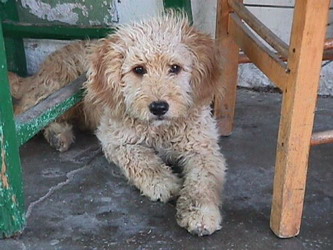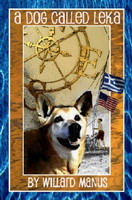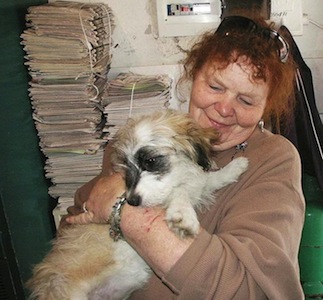
Stray Dogs in Athens
|
|
|
|
Stray dogs are a problem in Athens. Not because they will attack you or chase you through the city streets. It is mostly an image problem. You have this big modern city and wandering around, lounging in the shade, solo and in packs, are dogs. Some are pets, some are former pets and some have never been pets at all. The downtown dogs are pretty well behaved. Many are streetwise, literally. My mother was curious as to how they could cross some of the big Athens avenues so she watched them. She discovered that the dogs would go to the pedestrian crossings and stand there. No they did not know that the little green man meant it was OK for them to cross. They would wait until some humans came and then cross with them. Plaka and downtown dogs are very good natured. They are around people all the time and have few needs, all of which are available in the neighborhood: food, water and shade. |
|
|
Some of the dogs have hob-knobbed with the rich and famous. Bill Neil, author of Southern Cooking, told me of a night on the Acropolis when he and REM's Michael Stipe snuck in and befriended the strays that live on and around the ancient rock. I have seen stray Plaka dogs grooving to the Chieftans at the dirty corner in front of the monument to Lysacratus. Those of you who have seen the movie FOR THE LOVE OF BENJI may recall that when Benji gets lost in downtown Athens he is befriended by one of the Plaka dogs who took his siestas in the ancient agora. In fact it was the Plaka dog that protected Benji when the mean Dobermans that belonged to the bad guys came searching for him to find the micro-chip implanted in his fur, or collar (I forget which). A few years ago Kiki Zikou at Dolphin Hellas told me I needed to write an article about the dogs in the old airport. The next time I left Greece, sure enough there were dogs wandering around the terminal. With the new airport so far out of town it is unlikely that you will see any dogs and I am off the hook for the article I never got around to writing. Even so you have to wonder about a country that had dogs wandering around the airport. Maybe they were undercover police dogs. Maybe they belonged to an airport employee who could not leave them home in the apartment because they barked and bothered the neighbors so they just came to work with him. Most likely they were like any other stray dogs in Athens. They are such a part of the landscape that you don't even notice them. I remember coming home early one morning from the Plaka to my neighborhood in Agia Paraskevis in 1972. As I was walking up the hill I saw a pack of about twenty dogs coming towards me. This made me a little nervous. Who knew whether these were pets, or strays looking for a lone human to rip to shreds and devour without a trace. How many people, whose disappearance off the face of the earth had fueled stories of alien abductions, were merely eaten by packs of wild urban and suburban dogs? As these thoughts went through my head I realized that leading the gang of dogs was Reinhart, our family dog who lived in a suitcase on our back porch! He came up and greeted me with a sniff and a wag of his tail and then continued on to do whatever it is that packs of dogs do at four in the morning. (I was actually proud that our dog was the leader of the pack). I was bit once by a stray dog. It was in Exarchia and for some reason one of the dogs that hung out in the square decided he did not like me. He followed me, barking madly and I tried to ignore him but then he nipped my heal. I turned around and yelled at him and he ran away terrified. But that was three years ago and I have not been back to Exarchia since. Maybe the dog is gone. Maybe he was just having a bad day and didn't like the way I looked at him. Who knows? But that experience has kept me away from the neighborhood for the last three years and I can understand why the large numbers of dogs might make travelers uncomfortable. So why does Athens have such a big dog problem? Greek-American Tom Mazarakis explained on his website: I have been living in Greece for the last 33 years and am well acquainted with the recent history of the dog situation in Athens and the rest of Greece. As in most civilized countries, in Greece too, every municipality had a "dog pound" and a "dog catcher". And, as in most cities throughout the world, many domesticated dogs in Greece would one way or another gain their "freedom" from their owners. Either they would run away on their own, or they would be "let go" by irresponsible owners. Whatever the case may have been, these stray dogs often would breed and have puppies and multiply accordingly. The dog catchers in Greece used to step in and round up as many strays as they could. The strays were held in the local municipal dog pounds for a period of no more than 90 days, and if no one claimed the dogs, they were typically then put to sleep. This system kept the stray dog population down to a manageable level up until about 10 years ago. At about that time, a local animal rights activist group found out about a particular dog pound that kept their dogs in miserable and inhumane conditions. They visited the pound and filmed the scene. Then they took their evidence and presented it to the local District Attorney who in turn issued a warrant for the responsible mayor's arrest. That mayor was charged with the crime of "maltreatment of animals" which is a very serious offense in Greek law. He was convicted and sentenced to several months in prison along with a stiff monetary fine. As a result, almost every municipality in Greece dissolved their dog pounds and fired their dog catchers. As you can understand, this paved the way for the stray dogs to multiply without restriction, and today they have become a serious problem. Many people, and especially children, have been attacked and mauled by gangs of wild dogs. But, no one takes responsibility. The local Humane Society has been making every effort it can to feed and take care of as many stray dogs as they can handle, but their numbers keep growing. They try to neuter as many of the dogs as they can, but they just can't seem to put even a small dent into the problem. (from www.greecetravel.com/mazarakis ) You also have to look at the Greek relationship with animals to understand the problem. The concept of animals as pets is relatively new. The majority of Athenians come from rural roots and people had animals for a purpose. A donkey was for carrying things. A cat was to kill rats. A dog was to tend sheep, hunt or keep wolves and predators away. When I moved to Athens in the sixties, dogs as pets were as common as chinchillas are now. (Our landlady had a French poodle. But she spoke French too.) Normal people did not have dogs. In the seventies dogs suddenly became fashionable, especially collies, and every one was named 'Lassie'. But only a small percentage of people realized that having a dog was not as easy as owning a plant and when they found out, they did what people in the USA used to do (and some still do). They took the dogs for a ride. When they were far enough to be sure that the dog would not find its way back home they opened the car door and 'set him free'. Some people with cats took them to the National Gardens and on warm sunny days you would see colonies of them lounging on the grass near the Parliament building. I myself was guilty of taking several pets 'to the park' as we used to say. I was leaving Greece for the winter and had three ducks that I knew would not survive in the city streets. The pond seemed like the best place for them. Now there is a duck population that has grown out of control though for some reason it has not received the attention that the dogs have. This year the municipality knew they had to act on the dog problem because of the upcoming Olympics, especially after some of the dogs interfered with some of the Olympic trials and even competed in the Marathon. The municipal plan was simple. They would round up the dogs and take them to a farm or kennel or somewhere they could stay outside the city. Then when the Olympics were over they would bring them back to where they found them and set them free again! Obviously this solves the image problem of Athens for the Olympics, at least concerning the dogs, but then after the Olympics you are back at square one with a city full of strays who just got a free holiday in the country. Then one day in the fall of 2003 I made a discovery. We had gone to dinner in Fokoinos Negri at a psistaria and had a meal of steaks and lambchops and had lots of meaty leftovers. We put them in a bag with the intention of feeding one of the dogs that hang out in front of the apartment buildings on the large pedestrian street that the area is named for. We did not find any dogs. In fact we walked all the way to the Attalos Hotel on Athinas street several kilometers away and still did not see any dogs. I ended up leaving the bones in the bushes in front of the municipal police station in the hopes that some dog might show up and smell it. It was not until I came back to the USA that I heard on NPR that some 3000 dogs had been poisoned. Some people blamed the municipality and others blamed the Athens Olympic Committee. Why adopt 3000 dogs and have to feed them for a year when you can just feed them poison once and be done with it? I mean if you are looking for a purely economical solution this would be the way to go. But you better have a good cover story because every dog lover and animal rights activist is going to come after you with a vengeance and Athens won't be known as 'the city with the stray dog problem', but as 'the city with a government so heartless that they would murder 3000 stray dogs to avoid the cost and responsibility of taking care of them'. Do I think the municipality of Athens murdered these dogs? It is hard to believe. But it is equally difficult to believe that a few neighbors who were tired of seeing so many stray dogs decided to take matters into their own hands and bought enough meat and poison to kill 3000 of them. Nearly every neighborhood has some nutcase who poisons cats and dogs but to kill 3000, these people would have to have an organization and a union. Chances are we will never find out what happened to these dogs. The fact is that despite the humorous way I am presenting this there is a problem with the Greek attitude towards animals which won't be fixed overnight. For whatever historical reason there are still people that have either a fanatical dislike or fear of animals, or they have a compulsion to kill and animals are easy victims. The poisoning of strays has been going as long as I have been coming to Greece and it won't go away easily. Like stopping people from thoughtlessly littering it will take a program of education and probably serious punishment when offenders are caught. It will also take a comittment by the authorities to catch offenders rather than ignore them or see them as some kind of 'short term cure' to an unpleasant problem of which there are no easy solutions. The first question you may have as a visitor is 'are you safe from being mauled by packs of wild dogs in Athens?' The answer is yes. No tourist has been attacked yet besides me and I am not a tourist and I was not really attacked. The second question is ' is there anything you can do to solve the problem of strays in Athens and in Greece?' The answer to this is also yes. You can adopt one and bring it home with you! Sound far-fetched? You might be surprised at how many people have fallen in love with a dog or cat in Greece and taken them home. You can say what you want about them being an eyesore or a nuisance but for some reason these animals have a lot of character and it is not such an unlikely scenario that one might steal your heart. It happens:
At about the same time as Stepanie was adopting her new pet, the municipality and Athens 2004 unveiled their plans too: GREECE: October 6, 2003 ATHENS - Athens, host of the 2004 Olympics, launched a plan last week to sterilize more than 10,000 stray dogs ahead of the Games in measures condemned by animal rights groups as ill thought-out and insufficient. The city said the 1.8 million euro ($2.11 million) project, to be officially unveiled on the weekend, will halt the growth of a huge population of stray dogs roaming the streets of the capital before the start of the Olympics. "The sight of thousands of stray animals living without care in the city streets constitutes an insult to us as civilized people," Athens Mayor Dora Bakoyanni, who plans to give 20 strays up for adoption on the weekend, said in a statement. The project, co-funded by the city and the government, aims to collect, sterilize and tag the dogs, before releasing them again. Two mobile vet units will monitor their health. But animal rights groups say the plan does not cover the needs of strays. "This cannot be just a one-day event with some promises and cute puppies as gifts," Marianna Polichroniadou, head of a newly-founded animal rights group said this week. "It has to be followed up with actions that safeguard the dog's survival long-term and this plan doesn't cut it." Dog lovers say city authorities are also responsible for killing more than 3,000 dogs in the past months, to rid the capital of the animals ahead of next year's Games. "Why have all the dogs suddenly disappeared from the city center and why are they launching this plan now?" Polichroniadou asked. REUTERS NEWS SERVICE I guess you could call this the 15 year plan for ridding the city of stray dogs. Fifteen years because that is the average life of a dog. The idea is that if you neuter all the dogs and then set them free again, they won't be able to have puppies and in 15 years they should all be gone, provided no other un-neutered strays join them. The plan that I have heard is to have all pets implanted with a chip so they can be tracked if irresponsible owners let them go. When they are picked up both the pet and the owners will be neutered. One final note: When I was in Athens in November of 2003 we went out to dinner in Psiri at a famous taverna which specializes in paidakia (grilled lambchops). As usual we ordered too many and after we finished we got a 'doggy bag' to take with us to give to the street dogs. There is an old woman who wanders around Psiri with a half dozen dogs. We found her and asked if she would like the leftovers for her dogs. She looked at the leftovers and asked if it was OK if she ate them too. Of course we said it was. I bring this up only to remind people to remember to take pity on the human strays who may be in need of a helping hand too. What can you do if you are unable to adopt a stray dog or cat? How about sending money to one of these organizations Help Find Dogopotomus
*During the Olympics there were a few stray dogs lounging around on the streets of the Plaka. Most of them had been picked up and taken to the kennels outside of town and many people assumed they would never appear again. But the day after the closing cermonies, sure enough the dogs began appearing on the streets, well fed, groomed and looking like they had been on holiday. Are the stray dogs of Athens Guardian Angels in disguise? Read this letter
Pet Food Bank in Greece is a non-profit program in Greece dedicated to assisting animal rescues with pet food and supplies.It is their mission to ensure that pets are not forgotten during economic hardships. The immediate vision of Pet Food Bank in Greece is to assist animal rescues with food, medicines and supplies as well as helping them with adoptions, sterilisations etc. In these hard economic times, the prices of everyday goods and services are steadily increasing, making everyday expenses difficult. Pets have become hidden victims. As many people are being displaced from their homes, pets are sometimes left behind or placed in shelters, or they are disposed of along roadsides to fend for themselves. It is our goal to assist during difficult times to keep animal shelters running. You can e-mail them at info@petfoodbankingreece.org or visit their website at www.petfoodbankingreece.org The Greek Animal Welfare Fund (GAWF), operating in Greece as Animal Action Greece, strives to improve the welfare of all animals in Greece. Founded in 1959, GAWF works with any animals that need our help. As well as practical and veterinary work, which is often life-saving, we campaign and lobby the Greek Parliament, support smaller animal welfare groups in Greece, run an education programme and offer training in animal care. We believe in working within Greece to find practical and sustainable solutions to animal welfare problems. See our website www.animalactiongreece.gr, email us info@animalactiongreece.gr or call us on Athens +30 2103840010 / London +44 (0)2073578500
|
|
|
Little Noah's Ark
Daskalogiannis 39 Chania, Crete Tel 28210 55030 or 6946 881155. |
Help Support Matt's Greece Guides
Do you enjoy using my site? Have you found it entertaining as well as useful? If so please show your appreciation by booking hotels through the travel agencies and the links found on my Hotels of Greece site. The small commission I make on the bookings enable me to keep working and in most cases you won't find them any cheaper by searching elsewhere.
You can find
hotels in Greece by location, price, whether or not it has a swimming pool, and see photos and reviews by using this link to booking.com which also contributes to my website when you book. If you are appreciative of all the free information you get on my websites you can also send
a donation through Paypal or Venmo
Join Matt Barrett's Greece Travel Guides Group on Facebook for comments, photos and other fun stuff. If you enjoy this website please share it with your friends on Facebook and other social media.


 Renowned author Willard Manus gives us this grand story of high adventure set on the beautiful Aegean Sea. A Dog Called Leka tells the story of Ben Edgeworth,
an eighteen-year old boy, and his remarkable dog Leka, as they sail among the Greek isles in a catamaran built by Ben himself. The reader will join with the two adventurers as they face unexpected dangers, learning to survive by their wits and skill. Leka came to Ben as a hungry stray, searching the shipyard for scraps of food. He quickly proves himself to be a faithful companion in an extraordinary journey that will stay with the reader long after the
last page is turned. Willard Manus was born and raised in New York City but lived for many years in the Greek islands, mostly in the village of Lindos, on the island of Rhodes. His experiences there were published in a memoir, THIS WAY TO PARADISE--DANCING ON THE TABLES. You can order this book through
Renowned author Willard Manus gives us this grand story of high adventure set on the beautiful Aegean Sea. A Dog Called Leka tells the story of Ben Edgeworth,
an eighteen-year old boy, and his remarkable dog Leka, as they sail among the Greek isles in a catamaran built by Ben himself. The reader will join with the two adventurers as they face unexpected dangers, learning to survive by their wits and skill. Leka came to Ben as a hungry stray, searching the shipyard for scraps of food. He quickly proves himself to be a faithful companion in an extraordinary journey that will stay with the reader long after the
last page is turned. Willard Manus was born and raised in New York City but lived for many years in the Greek islands, mostly in the village of Lindos, on the island of Rhodes. His experiences there were published in a memoir, THIS WAY TO PARADISE--DANCING ON THE TABLES. You can order this book through  Silke
Wrobel has been working in Chania, Crete for the past 24 years, crusading for the well being of animal life on the
island. She has helped over 10,000 animals and has found families for
thousands of animals all over Europe. Besides cats and dogs, Silke also
rescues wild birds (owls, hawks, sea herons), reptiles (native snakes,
sea turtles, lizards) and rodents (rabbits, hedgehogs. In 2004, Silke
received the medal of honor in Germany for Hellenic-German relations.
She is recognized by PETA and other international animal welfare
organizations.
Silke
Wrobel has been working in Chania, Crete for the past 24 years, crusading for the well being of animal life on the
island. She has helped over 10,000 animals and has found families for
thousands of animals all over Europe. Besides cats and dogs, Silke also
rescues wild birds (owls, hawks, sea herons), reptiles (native snakes,
sea turtles, lizards) and rodents (rabbits, hedgehogs. In 2004, Silke
received the medal of honor in Germany for Hellenic-German relations.
She is recognized by PETA and other international animal welfare
organizations. 


